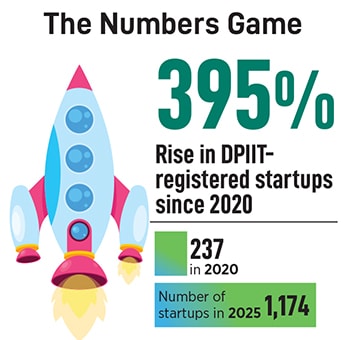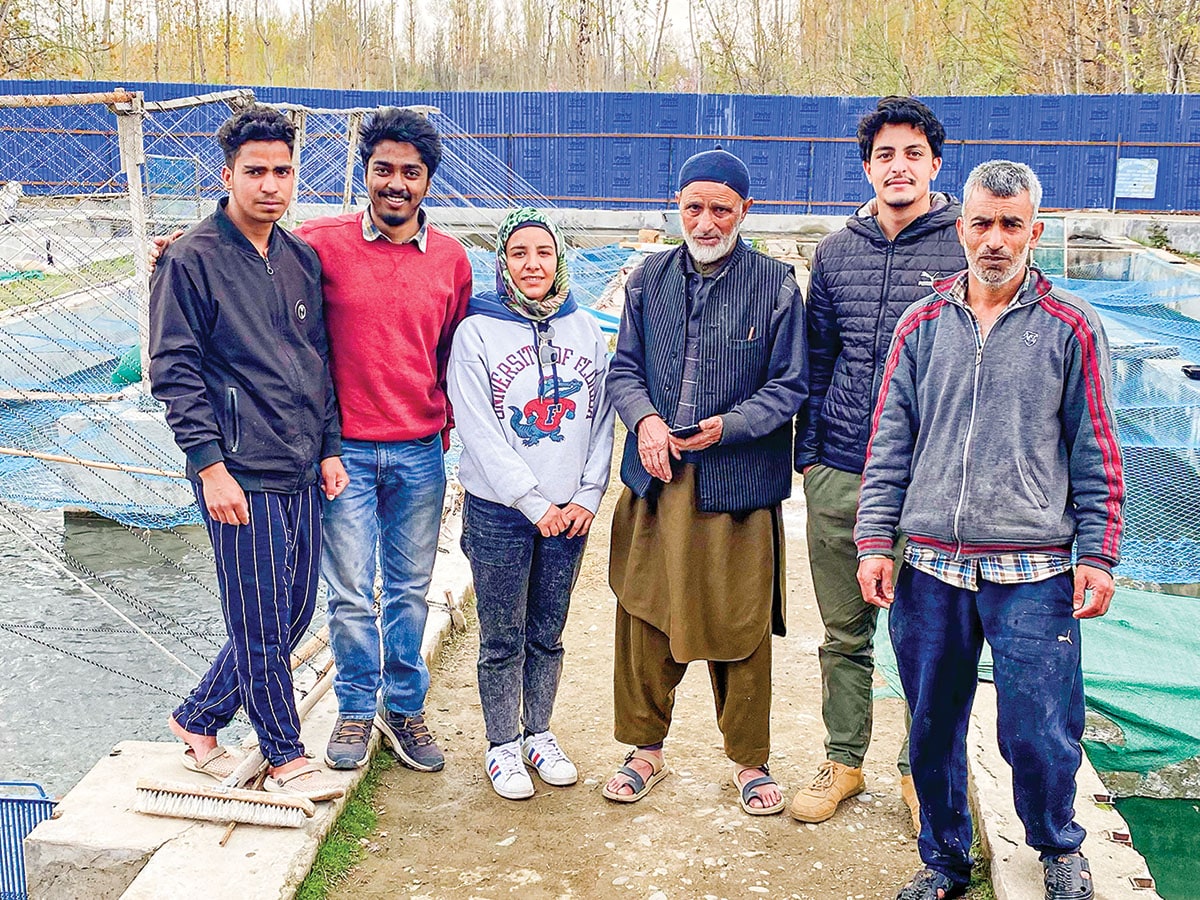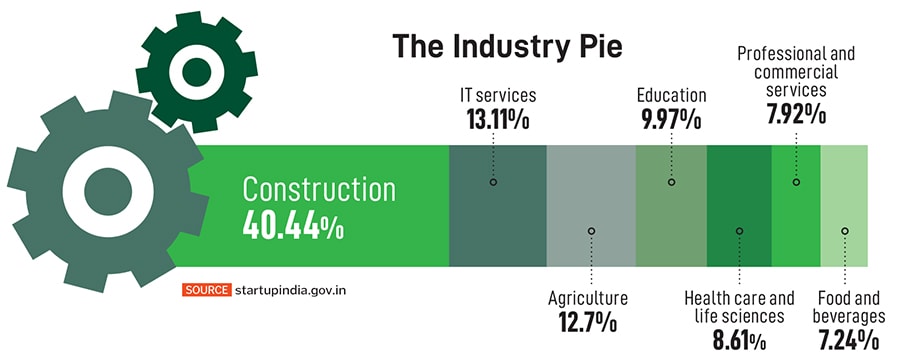From Kashmir to the World: Inside the Valley's startup boom
Startups in the Valley are taking the challenges of conflict and instability head on by building resilience and diversity into their models


The post-Covid influx of tourists to Kashmir brought with it not just business but also more congested roads and traffic jams. Friends Sheikh Yameen and Zubair Bhat saw an opportunity to solve the problem by introducing ebikes in Srinagar for shared mobility. After getting government permissions, Curve Electric went live in January 2023 with an app for the back end, putting a person in charge at their docking stations to ensure the bikes were maintained and to guard against theft and vandalism.
“We provide ebikes on rent to locals as well as tourists and we have had the development of cycling lanes as well. This has become the most time-efficient way to travel within the city," says Yameen, adding that, in the two and a half years since they started, they have done “around 80,000 rides and our ebikes have been used for more than 8,00,000 kilometres".
Curve Electric is currently present in two cities in Kashmir—Srinagar and Ganderbal—and the founders are planning to expand to other Himalayan cities like Dehradun and Shimla. They are also in talks with campuses and real estate companies to deploy their bikes for internal mobility. In May, they also started selling the bikes they make, a D2C approach that makes the two-wheelers available pan-India.
In a geography where most business is centred around tourism, construction or agriculture, Curve Electric is just one of the many startups coming up in Kashmir that is solving for the Valley and creating employment opportunities there, as well as taking their solutions to India and beyond.
In less than a decade, about 1,150 startups have emerged in the region, creating jobs for local youth, finding solutions to Kashmiri residents’ day-to-day problems, and giving ‘business in Kashmir’ an identity beyond tourism.
 Sheikh Samiullah (right) and Abid Rashid Lone, co-founders, FastBeetle, a logistics tech platform headquartered in Srinagar, Jammu & KashmirImage: Madhu Kapparath
Sheikh Samiullah (right) and Abid Rashid Lone, co-founders, FastBeetle, a logistics tech platform headquartered in Srinagar, Jammu & KashmirImage: Madhu Kapparath
It was when he was heading logistics at an ecommerce company that Sheikh Samiullah realised that towns and far-flung areas in Kashmir had few courier options for personal and business deliveries. Though there were bigger players, they were more focussed on the main towns and cities. Armed with local knowledge about the areas, Samiullah, who has a BBA in marketing and human resources from Kurukshetra University, joined hands with Abid Rashid Lone, who had been working as a chief technology officer in a company in Dubai, to launch logistics firm FastBeetle in 2019. “Ecommerce was starting to thrive in those days, and we saw that businesses, artisans, small businesses and women entrepreneurs working from home needed someone to pick up their packages and deliver across the city or outside and there was no strong logistics partner who could help scale their businesses," says Rashid.

 FastBeetle today has a network of collection centres and warehouses across Jammu & Kashmir, offering services across 18,000 pin codes in India and internationally, handling over 500,000 shipments monthly. They have around 350 employees, a number that varies with festive and sales seasons and tie-ups with ecommerce giants. FastBeetle was also the first startup from Kashmir to raise funds and has so far raised funds over four rounds, the last a Seed B round in July 2024, at a valuation of $5 million.
FastBeetle today has a network of collection centres and warehouses across Jammu & Kashmir, offering services across 18,000 pin codes in India and internationally, handling over 500,000 shipments monthly. They have around 350 employees, a number that varies with festive and sales seasons and tie-ups with ecommerce giants. FastBeetle was also the first startup from Kashmir to raise funds and has so far raised funds over four rounds, the last a Seed B round in July 2024, at a valuation of $5 million.
“Himalayan Rainbow Trout has been cultivated in Kashmir since British times and its taste is very similar to the Atlantic or Norwegian salmon," says Saurav P Satish, co-founder of Zarin, who had taken up the Naropa Fellowship where he met his co-founders Syed Faaiz Qadri and Rifat Amin Lone. (The Naropa Fellowship is a one-year residential programme for postgraduate candidates designed for leadership development in the Himalayas.) They realised that though there was demand for trout across the country, Kashmiri fish farmers had a limited market, selling it to residents in and around their farms, since there was no cold chain to supply it to other parts of the country.
Both had no idea about handling or transporting fish and did a six-week training programme at the Central Institute of Fisheries Technology in Cochin before setting out to send the first batch of fish from Kashmir to Cochin. “When that arrived, we realised we had the ability to move the fish from Kashmir to the entire country," says Satish.
 Zarin’s co-founders Saurav Satish (second from left), Rifat Amin Lone (third from left) and Syed Faaiz Qadri (fifth from left) along with fish farmers
Zarin’s co-founders Saurav Satish (second from left), Rifat Amin Lone (third from left) and Syed Faaiz Qadri (fifth from left) along with fish farmers
It was also in Cochin that they connected with FreshToHome co-founder Mathew Joseph, and tied up to supply to them. Four years later, Zarin has 15+ enterprise clients and has supplied 8 metric tonnes of fish to more than six cities. Zarin supplies Rainbow trout and trout roe to cities like Delhi, Mumbai, Cochin, Bengaluru, other players in the market like Licious as well as premium restaurants and luxury hotels in Mumbai. They also plan to come up with ready-to-cook or ready-to-eat products. “We are also looking for an opportunity to export," says Satish, head of sales and partnership, who works out of Bengaluru driving business and product development, while Faaiz Qadri, CEO, handles operations and procurement in Kashmir, working with farmers. They have signed up with 15 farmers from Pulwama, Anantnag and Kulgam so far, who have increased their output, and therefore income, by 30 to 35 percent.
With a 5,000-metric-tonne Controlled Atmosphere (CA) storage facility and an AI-based grading and sorting line in Lassipora, Pulwama, third-generation apple grower Ubair Shah is also working towards helping apple growers store, preserve and access better markets for their produce, rather than being forced to sell immediately after harvest.

Shah, who has an MBA from Coventry University in England, decided if Washington apples could find their way to Indian fruit bowls through the year, so could Kashmiri apples, and started Efruitmandi, a B2B fresh produce supply chain startup working across the apple value chain in Jammu & Kashmir, in 2018. “The biggest concern right now is climate change, which is disrupting traditional cropping patterns. The next phase of Efruitmandi’s evolution includes leveraging predictive analytics to prepare farmers better, from soil analysis and pest forecasting to real-time climate insights and market demand trends," says Shah. To scale these solutions and extend support to more farmers, Shah is currently in talks with investors to raise funds for his bootstrapped venture.
Gr8Sports, set up in 2021 by Fawzul Kabiir, meanwhile, has managed to put Kashmir willow bats—for long sent out of the state only as raw, basic bats or those for gully cricket—into the hands of international cricketers who have used it in World Cups and tournaments since.
 Fawzul Kabiir of Gr8Sports (left) a worker crafts bats at the factory in Kashmir Ubair Shah of Efruitmandi, a B2B fresh produce startup
Fawzul Kabiir of Gr8Sports (left) a worker crafts bats at the factory in Kashmir Ubair Shah of Efruitmandi, a B2B fresh produce startup
“When I first went to Australia and New Zealand to meet importers in 2010, I realised that what we were making at our family factory was nothing like the bats professional cricketers used," says Kabiir who was 18 at the time. The bats, he says, had no sense of dimension, sweet spot or balance.
That family factory shut down but he researched and worked on bats using “AI-based technologies" and came up with a professional level bat in 2019. It would still be a couple of years before he received International Cricket Council certification in 2021, and a Gr8 Sports Kashmir willow bat made its first appearance in an Oman versus Bangladesh match in October 2021. “We now have 738 different cricket bat profiles with different permutations and combinations," says Kabiir, whose factory has 67 employees. Besides the funds he had invested, GR8 Sports had received ₹50 lakh in seed funding from Startup India and was also one of the winners at the Startup Mahakumbh this April.
Building and scaling in a challenging landscape FastBeetle started in April 2019 but, a few months later, the abrogation of Article 370 and the subsequent 18-month-long internet shutdown put a spanner in the works. The founders were, however, quick to pivot to 2G and continued to function, and during the Covid pandemic even applied for curfew passes so that they could deliver everything from medicines to food to oxygen cylinders.

Since then, internet connectivity has improved but the challenge of Kashmir being a high-conflict zone remains. Startup models, therefore, have to build in resilience through diversification and by catering to markets outside Kashmir.
“Tourism is the first thing that gets affected when an incident like Pahalgam happens," says Anuj Sharma, founder of startup incubator accelerator Alsisar Impact, referring to the terrorist attack in the Valley in April in which 26 civilians were killed. Alsisar Impact, which works mainly in the Himalayan region, has been working in Kashmir since 2018, helping incubate startups, providing seed funding and later helping them scale and raise funds. “So they need to diversify. If everybody does homestays or hotels, it’s not going to work because, in a conflict zone, that is the first thing that gets affected if curfews are imposed," says Sharma, adding, “Whatever they do, they need to see that they can have a model that caters to markets outside Kashmir also."
While startups like Zarin and Efruitmandi have ensured markets outside of Kashmir, startups like Curve Electric have localised their solutions smartly by catering to both tourists and locals, expanding their base and getting into manufacturing. “Even though 40 percent of Curve Electric’s users are tourists, 60 percent are locals. So even though they took a hit when Pahalgam happened, they were able to navigate the period of no tourism," says Sharma.

Considering the founders assembled their ebikes from scratch and have an integrated supply chain and rigorous data about the bikes’ functioning, they made a move into manufacturing as well. “We have sold 30 to 40 ebikes already and are now spending a little more on ads and other things," says Yameen.
FastBeetle, meanwhile, after cracking the delivery market and tie-ups with ecommerce giants as well as hyper local deliveries, is now working on going back to its core and synergising with micro entrepreneurs. “Now we are seeing if FastBeetle can become a kind of a platform for them to ship their products to larger cities. Then they can make revenue and, at the same time, back a larger number of people," says Sharma, calling it a sort of vertical integration that works as an origin story—“We are from Kashmir, we are backing a Kashmiri person and you are getting a Kashmiri authentic product."
After the Pahalgam attack, production at GR8 Sports stalled because workers left for their hometowns. “We have orders from Australia and New Zealand, around 100x of what we are producing. We are now trying to bring some investors on board so that we can execute the pending orders and take it forward," says Kabiir.
Conflict and instability are a challenge from the investor point of view, says Yameen of Curve Electric. Other challenges, they point out, are the lack of intellectual capital and human resources. “One of the biggest challenges we face is the dearth of human resources, because most of the top talent of the Valley still goes outside. Besides, until four or five years ago, the startup culture here was practically non-existent, so there is not a lot of hand-holding," says Yameen. Shah of Efruitmandi agrees. “Raising capital in this space remains difficult due to challenges like limited intellectual capital, lack of structured mentorship, and the overall perception of agritech risk."
 Ubair Shah of Efruitmandi, a B2B fresh produce startup
Ubair Shah of Efruitmandi, a B2B fresh produce startup
All that seems to be changing now. Alsisar Impact has been incubating startups and providing seed capital in the Valley since 2018, and the J&K government’s new Startup Policy 2024-2027, focussed on providing a boost to the state’s startup ecosystem, besides setting up incubation centres and providing grants, aims to encourage networking and collaboration by organising and supporting events like conferences, trade shows, and meetups, to bring startups, entrepreneurs, investors and other stakeholders onto a single platform.
As part of the policy, a ₹250 crore venture capital fund is being set up, with an initial infusion of ₹25 crore by the UT administration. “We are reaching out to the metropolitan areas, to see where there are investors, venture capital firms, angel investors so that we are able to invite them here," says Irtif Lone, I/c, Centre for Innovation Incubation and Business Modelling, JKEDI, adding that there are currently about 1,174 startups registered in Jammu & Kashmir “and the aim is to get to 2,000 by 2027".
It doesn’t seem to be a big ask. Conflict and political instability apart, the opportunities in Kashmir are immense. “It’s a virgin territory, we don’t have much competition. The income profile of people is good which helps with your products," says Yameen of Curve Electric. “Besides a lot of young talent is coming up now."

Kashmir, adds Sharma, is an around-$30 billion economy. And it’s highly undervalued. Whether it be apples or saffron or basmati rice, “Kashmir has high-value products and some kind of value unlocking has to happen," he says.
Kashmir is late to the startup party and the ecosystem may not be on a par with Bengaluru or other major cities, but it is growing slowly and steadily. “It’s an egg-and-chicken situation—will the startups come first and supporting infrastructure and ecosystem come later, or the ecosystem come first and then the startups," says Yameen, adding that he sees an increase in both.
“Once we have success stories—and they have now started to come up—once they percolate in the society, a lot more people would be interested to be investors, to be mentors, to help these startups network with the wider range of startups, nationally and globally as well," says Lone.
First Published: Aug 21, 2025, 14:40
Subscribe Now